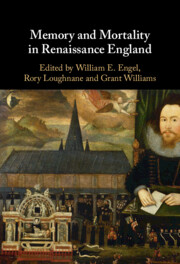Book contents
- Memory and Mortality in Renaissance England
- Memory and Mortality in Renaissance England
- Copyright page
- Dedication
- Contents
- Figures
- Notes on Contributors
- Acknowledgements
- Introduction
- Part I The Arts of Remembering Death
- Part II Grounding the Remembrance of the Dead
- Chapter 5 Memory, Climate, and Mortality The Dudley Women among the Fields
- Chapter 6 Scattered Bones, Martyrs, Materiality, and Memory in Drayton and Milton
- Chapter 7 Theatrical Monuments in Middleton’s A Game at Chess
- Chapter 8 Thomas Browne’s Retreat to Earth
- Part III The Ends of Commemoration
- Parting Epigraph
- Bibliography
- Index
Chapter 6 - Scattered Bones, Martyrs, Materiality, and Memory in Drayton and Milton
from Part II - Grounding the Remembrance of the Dead
Published online by Cambridge University Press: 06 October 2022
- Memory and Mortality in Renaissance England
- Memory and Mortality in Renaissance England
- Copyright page
- Dedication
- Contents
- Figures
- Notes on Contributors
- Acknowledgements
- Introduction
- Part I The Arts of Remembering Death
- Part II Grounding the Remembrance of the Dead
- Chapter 5 Memory, Climate, and Mortality The Dudley Women among the Fields
- Chapter 6 Scattered Bones, Martyrs, Materiality, and Memory in Drayton and Milton
- Chapter 7 Theatrical Monuments in Middleton’s A Game at Chess
- Chapter 8 Thomas Browne’s Retreat to Earth
- Part III The Ends of Commemoration
- Parting Epigraph
- Bibliography
- Index
Summary
Milton’s Sonnet XVIII (‘On the Late Massacre in Piedmont’) propounds a familiar opposition between the ‘pure’ religion of Protestants and a corrupt Catholicism obsessed with material objects and images (‘stocks and stones’). Yet this ostensibly anti-Catholic poem veers brazenly and repeatedly into the language of relic veneration. Beginning with the poignant spectacle of the Waldensians’ bones scattered on the mountainsides, the sonnet goes on to weaponize human remains and grants them sacred force in the form of ‘martyred blood and ashes’ to be sprinkled over Italy. This chapter explores historical, confessional, and literary contexts for Sonnet XVIII’s surprising investment in human remains, both as objects arousing pity and as capable of a kind of material efficacy. Milton’s poem is situated within an extensive tradition of English Protestant poets and preachers, including Michael Drayton, John Donne, and Richard Crashaw, who had wrestled with the question of relics and the problem of scattered bones.
- Type
- Chapter
- Information
- Memory and Mortality in Renaissance England , pp. 123 - 140Publisher: Cambridge University PressPrint publication year: 2022

